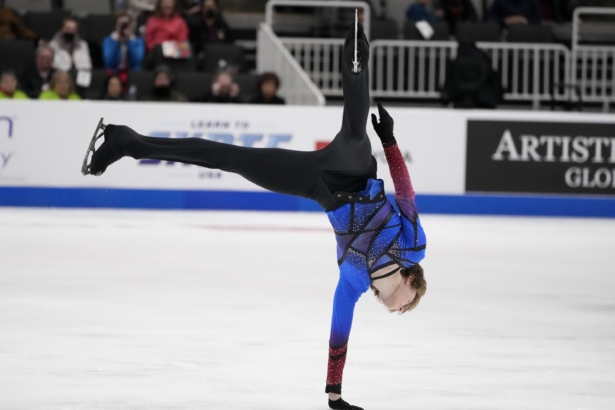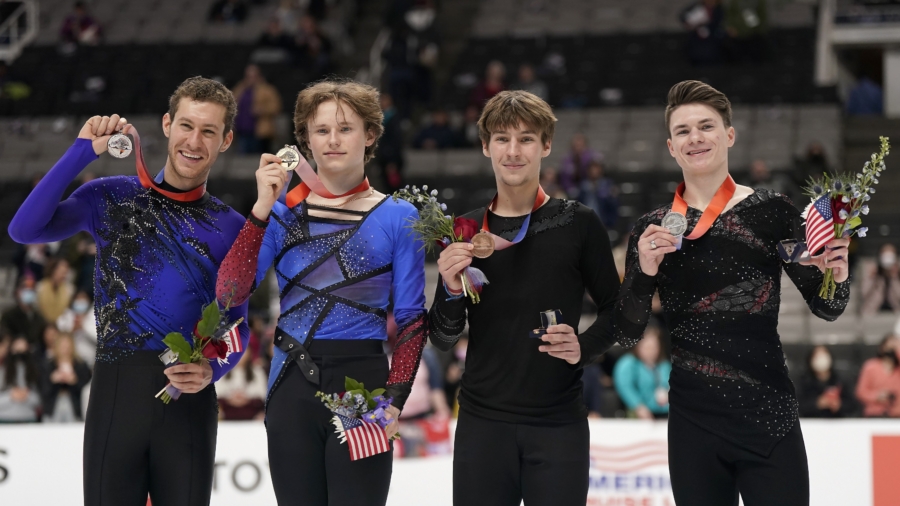SAN JOSE, Calif.—As the cameras flashed in front of the medal-winners in U.S. men’s figure skating, one photographer had a request: “Ilia, for one, look happy.”
At that, Ilia Malinin chuckled and obliged with a grin, then quickly returned to the close-lipped smile he’d been wearing since he was crowned a national champion on the final day of the U.S. Figure Skating Championships.
Though his free skate was not without flaws, Malinin landed three quadruple jumps Sunday for a 177.38, a total score of 287.74 and his first U.S. men’s title. Malinin retained his 10-point lead over second-place finisher Jason Brown, while Andrew Torgashev topped a strong weekend with a bronze medal and recorded the highest segment score of the event with 177.78.
Malinin did doubles instead of two planned quads midway through his program, then recovered with a triple lutz-triple axel-triple toe loop sequence that earned him more than 21 points for his final jumping pass. He also fell on his signature quad axel; Malinin is the only skater in history to cleanly land the 4 1/2-revolution jump in competition.
“This wasn’t the skate that I wanted,” Malinin said. “There’s always ups and downs, and you just have to get over it and move on for the next thing.”
Malinin said he came into Sunday’s event with less energy than usual, having spent the bulk of his time leading into nationals refining his short program. That effort paid off, but he believes it cost him in the free skate.
“I think I was a little bit sluggish back there,” he said, “and I just wasn’t very prepared for what was about to happen.”

Brown’s 177.06 in the free skate gave him the silver medal. The 28-year-old veteran, who performed a routine to Josh Groban’s “The Impossible Dream,” had not competed since finishing sixth at the 2022 Beijing Olympics.
Going up against a slate of competitors with superior technical content, Brown needed to be all but perfect—and he got close. Opting not to attempt a quad, Brown was clean up until his final jump—a triple flip—but recovered with his trademark poise and earned a raucous standing ovation.
The last time nationals were held at the SAP Center in 2018, Brown had a disappointing free skate that dropped him three places in the standings. That experience made him nervous to return, but he was proud of his performance, proclaiming: “The demons are gone.”
Torgashev opened his program with a quad toe loop and saved his three combinations and sequences for last, taking advantage of the second-half scoring bonus. He called the experience “surreal” after missing much of the last two seasons with injuries.
Joining Torgashev in making his first national podium was Maxim Naumov, who finished in fourth place. Though he fell on an early triple axel, he skated clean the rest of the way for a 171.43 score.
Malinin joins 15-year-old Isabeau Levito as a first-time national champion, representing the potential dawn of a new era in U.S. singles skating.
The youth movement hasn’t entirely taken over the sport, though, as ice dancers Madison Chock and Evan Bates and pairs duo Alexa Knierim and Brandon Frazier became the first skaters in their 30s to win their respective disciplines at nationals in more than 50 years.
But instead of basking in his achievement, Malinin sat with a stoic expression, noted the many ways in which he could learn from his imperfect performance and vowed to be better at the upcoming world championships.
Olympic champion Brian Boitano, the first U.S. skater to land a triple axel, offered his insight on the unique pressure Malinin faces.
“It’s hard to be a pioneer,” Boitano said. “When there’s nobody else doing it, it’s a really hard situation. You have to push yourself.”
And leaning on experience from his storied career, Brown had a message for the newly crowned champion.
“I first just want to tip my hat off to Ilia,” he said, turning to face Malinin. “You did a triple lutz-triple axel-triple toe at the end of your program, and I did a knee slide and could barely get up to do a triple flip. And I fell … All I can say is just keep it up, because it’s incredible, and the way that you’re pushing the sport is incredible.”
By Sonja Chen

